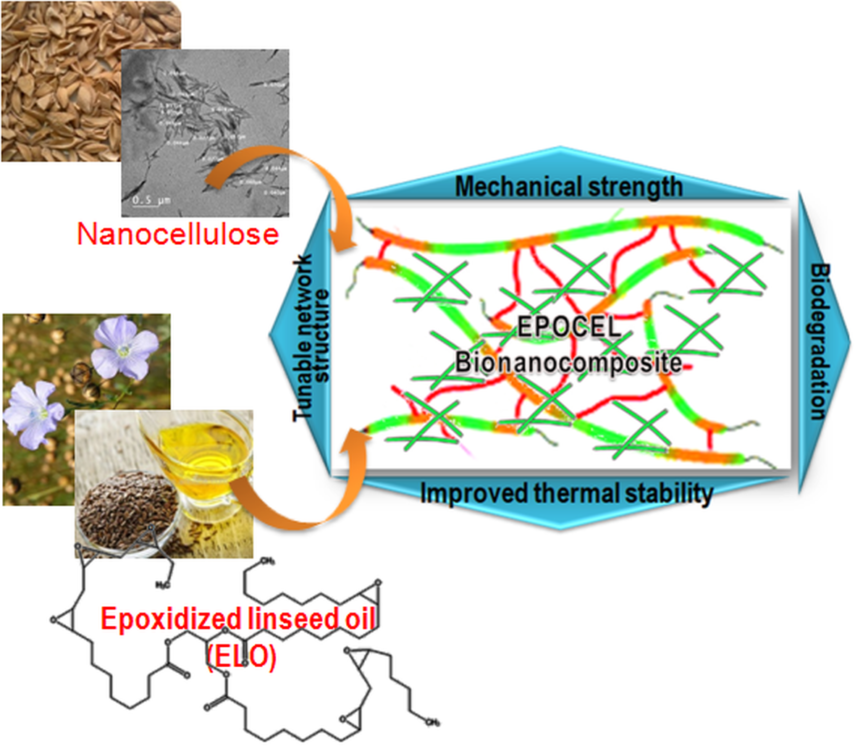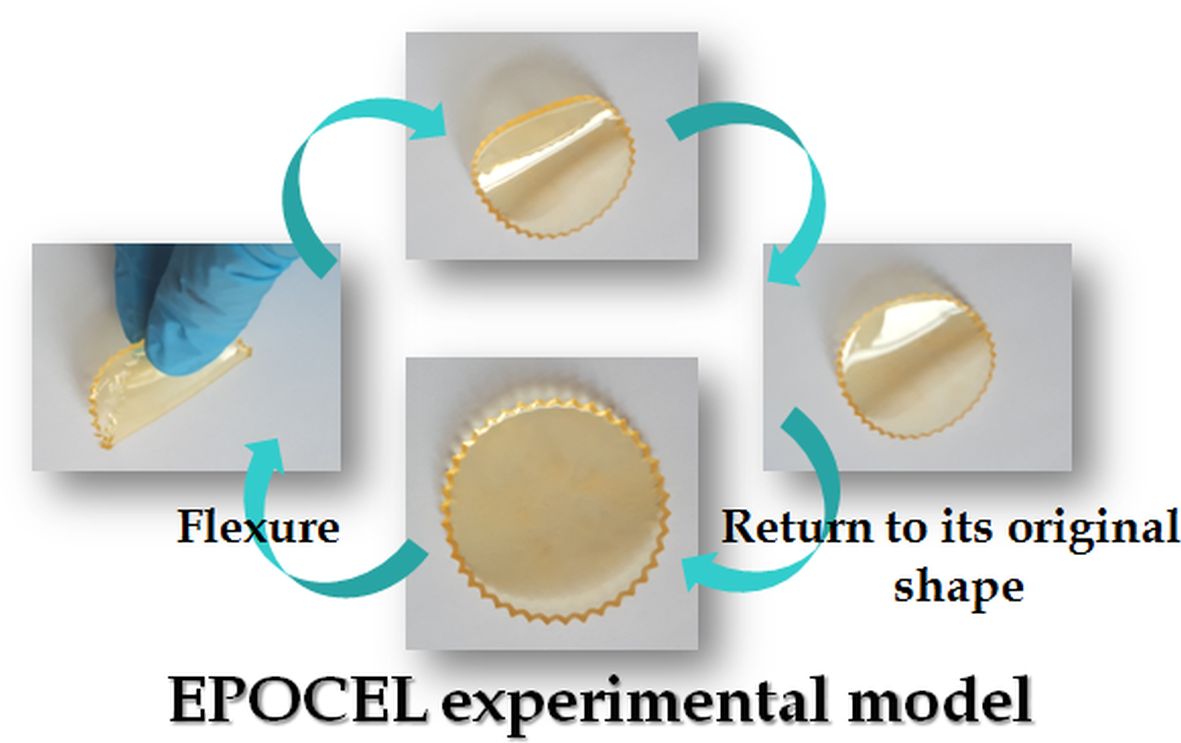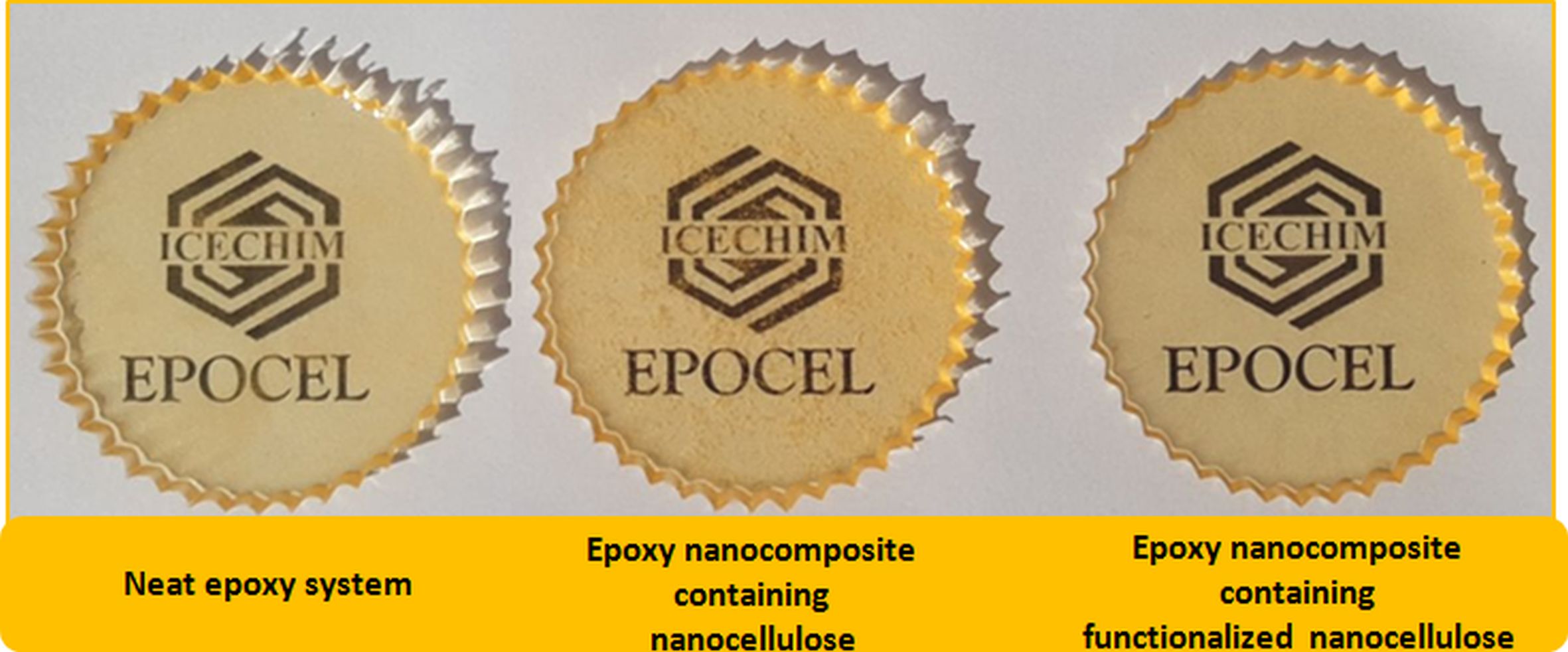Bio-based nanocomposites from epoxy-celullose with balanced thermo-mechanical properties – EPOCEL

Funding: Romanian Ministry of Education and Research, CNCS – UEFISCDI
Programme: PNCDI III – Demonstration experimental project 2019, PN-III-P2-2.1-PED-2019-5002
Research domain: 4.3 – Advanced materials
Project title: Bio-based nanocomposites from epoxy-celullose with balanced thermo-mechanical properties – EPOCEL
Financing contract: no. 530PED
Total funding: 600.000,00 RON
Project duration: 24 months
Period of project implementation: 28.10.2020 – 27.10.2022
Contractor: National Institute for Research & Development in Chemistry and Petrochemistry – ICECHIM, Bucharest
Project Leader: PhD Eng. Adriana Nicoleta Frone
E-Mail address:
Partner: University POLITEHNICA of Bucharest
Project Responsible: Prof. PhD Eng. Horia Iovu
E-Mail address:
PROJECT IMPLEMENTATION TEAM
ICECHIM:
Frone Adriana Nicoleta, CS 1, Project Leader
Vuluga Zina, CS 1, Research Member
Panaitescu Denis Mihaela, CS 1, Research Member
Corobea Cosmin, CS 1, Research Member
Nicolae Cristian-Andi, CS 1, Research Member
Gabor Augusta Raluca, CS 3, Research Member
Ianchiş Raluca, CS 1, Research Member
Radu Elena-Ruxandra, ACS, PhD Student
Ştefania Bădilă, ACS, Research Member
Popa Marius Stelian, ACS, Research Member
Teodorescu George-Mihail, ACS, PhD Student
Radu Dorian, Technician
UPB:
Damian Celina Maria, CS 3, Partner Responsible
Horia Iovu, CS 1, Research Member
Gârea Sorina Alexandra, CS 1, Research Member
Brinduşa Bălănucă, CS 3, Post-doc
Pandele Andreea Mădalina, CS 3, Research Member
Necolau Mădalina, PhD Student
PROJECT SUMMARY
Epoxy resins are being used in many key applications of the automotive manufacturing industry due to their properties such as high thermal stability, mechanical strength, moisture resistivity and adhesion. Although these materials have a high performance in electronics their end-of-life disposal raised tremendous global environmental concerns. Thus, designing novel biomaterials able to overcome these disadvantages have become an important goal for the scientific community.
The proposed project aims to develop new nanocomposites, based on renewable and inexpensive biological sources, with thermo-mechanical balanced properties for applications in electronics (EPOCEL). The goal of this project will be achieved through the use of renewable resources like vegetable oils and different nanocellulose fillers. The EPOCEL nanobiocomposite materials will exhibit a tailored interface design which will assure performances comparable to those of petroleum-based but at a lower price. The project approach is based on the association of materials produced from regionally low cost agricultural feedstocks which will be employed for the development of novel materials with high – added value. Various epoxy system components and different agents for nanocellulose functionalization will be screened for achieving the desired thermal and mechanical performances. Nanocellulose will have a significant role in providing biodegradability besides controlled stiffness. The assessment of the EPOCEL model for electronics will be made after detailed analysis of physico-chemical, mechanical and thermal properties.
NOVELTY AND ORIGINALITY
The project EPOCEL brings its original contributions by developing novel nanocomposites based on renewable materials with performances comparable to those of petroleum-based intended for electronics.
OBJECTIVES
Specific objectives:
Considering the unmet and increasing demand for new biobased materials intended for electronics together with the expertise of the team in thermoset materials, CN isolation and functionalization, the following specific objectives of the project have resulted:
- Development of new bionanocomposites based on ELO and CN with improved mechanical, and thermal properties;
- Finding new innovative routes for optimization of biomaterials components;
- Demonstration of resulted biomaterials suitability for electronics applications;
- Bionanocomposite processing as models for electronics;
ESTIMATED RESULTS
Within this project we estimate the obtaining of the following results:
- New bionanocomposites with improved mechanical and thermal properties using epoxy resins obtained from renewable sources, natural eco-friendly compounds as curing agents and nanocellulose;
- Innovative routes for optimization of bionanomaterials;
- EPOCEL model;
- Patent application;
- Dissemination of scientific results through publications and participation in conferences.
PHASES
PHASE I
Title: Setting up the preliminary conditions for synthesis of epoxy system and preliminary compatibility tests (I)
Period: 28.10.2020 – 31.12.2020
Summary of the activity report
During the first stage of the EPOCEL project, the parameters for the development of bio-epoxy matrix systems were identified and optimized. First, the protocol for obtaining epoxidized linseed oil (ELO) starting from commercial linseed oil was defined. The process employed for the obtaining of ELO based on the use of peracetic acid generated in situ, led to a high reaction yield of 96%. The results of the structural analyzes, FTIR and NMR, confirmed the efficiency of the linseed oil epoxidation reaction. Citric acid (CA) was tested as a crosslinking agent for epoxy ELO-based networks and its effectiveness was compared to that of a synthetic crosslinking agent (D). Another direction investigated in this stage was the selection of the best activator of the crosslinking reaction between water (W) and tetrahydrofuran (THF). Based on protocols developed during this stage, an optimal temperature program was developed for the crosslinking of the proposed epoxy systems. The results of the structural and thermal analyzes demonstrated the efficacy of the CA natural compound as a crosslinking agent for all studied bio-epoxy systems. Moreover, yields of up to 99% were obtained depending on the temperature and time of the crosslinking reaction. The preliminary results show that the bio-epoxy matrix systems proposed for the development of a high-performance bionanocomposite for electronics are promising due to their high reactivity, similar to commercial synthetic epoxy resins.
PHASE II
Title: Setting up the preliminary conditions for synthesis of epoxy system and preliminary compatibility tests (II); Structure and composition analysis; Designing and characterization of bionanocomposites
Period: 01.01.2021 – 31.12.2021
Summary of the activity report
The general objective of the second stage of the EPOCEL project was obtaining and characterization of bionanocomposites as a basis for the elaboration of the EPOCEL experimental model. Thus, following the experimental works, the materials that will constitute the bio-epoxy system were selected and characterized. Among the studied systems, the ELO/CA/THF sample showed the best thermal stability as compared to the commercial crosslinking system. Thus, THF can be considered as an effective activating agent for the ELO/CA bio-epoxy system. It showed a crosslinking density value
two times higher than that of the ELO/CA/W system and six times higher than that of the commercial system. In addition to the improved thermal and
mechanical characteristics, the biodegradability test indicated that the bio-epoxy systems crosslinked with CA have the ability to degrade in the environment as compare to the commercial epoxy system.
Another research direction was the surface modification of nanocellulose (NC) for improving its compatibility with the epoxy system. In this regard, organosilane coupling agents, mono-, di- and tricarboxylic acids as well as vanillin, a compound with mixed functions, containing aldehyde, hydroxyl and ether groups were tested as modifiers of nanocellulose. NC surface’s modification with silane and vanillin coupling agents has led to a significant increase in thermal stability. Afterwards, bionanocomposites from functionalized NC and bio-epoxy resin systems were obtained and optimized considering different concentrations of functionalized NC (0.25, 0.5 and 1%). TGA and DMA analyses indicated that an efficient crosslinking of the bio-epoxy system took place with the increase of functionalized-NC concentration. Moreover, a good correlation between the storage modulus and the calculated crosslinking density was observed. Following the research works carried out, the planned objectives of this second stage of EPOCEL project were thus achieved: the methodology for crosslinking the epoxy system and for dispersing NC; methodology for obtaining functionalized NC; methods for obtaining bionanocomposites.
Also, a part of the obtained results were disseminated by publishing an article (IF>4), sending an article for publication (IF>5) and by participating in 4 international and one national conferences (4 oral presentations and 1 poster presentation).
DISSEMINATION
PAPERS
- Popa, M.S.; Frone, A.N.; Radu, I.C.; Stanescu, P.O.; Truşcă, R.; Rădiţoiu, V.; Nicolae, C.A.; Gabor, A.R.; Panaitescu, D.M. Microfibrillated Cellulose Grafted with Metacrylic Acid as a Modifier in Poly(3-hydroxybutyrate). Polymers 2021, 13, 3970. https://doi.org/10.3390/polym13223970 (IF=4.329)
- Madalina Ioana Necolau, Celina Maria Damian, Brindusa Balanuca, Sustainable strategy to obtain epoxy-based materials with competitive thermo-mechanical properties. Submitted to Industrial Crops & Products Journal (IF=5.645)
CONFERENCES
- Mădălina Ioana Necolau, Brȋnduşa Bălănucă, Celina Maria Damian, Horia Iovu, Bio-based Epoxy Networks – Comparative Study of Different Curing Systems, 2nd Bucharest Polymer Conference, 10-11 June 2021 – Young Scientist Science Presentation
- Mădălina Ioana Necolau, Brȋnduşa Bălănucă, Celina Maria Damian, Horia Iovu, Sustainable approach to fabricate epoxy/nanocellulose composites and their properties, 7th Young Polymer Scientists Conference and Short Course, 27 – 28 September -Poster presentation
- Mădălina Ioana Necolau, Brȋnduşa Bălănucă, Celina Maria Damian, Horia Iovu, Novel composite materials based on epoxidized vegetable oil and nanocellulose, 5th Virtual Edition of Polymers, Plastics and Composites, 15 November -Oral presentation
- Marius-Stelian Popa*, Celina Maria Damian, Brîndușa Bãlãnucã, Denis Mihaela Panaitescu, Raluca Augusta Gabor, Cristian Andi Nicolae, Valentin Radiţoiu, Monica Florentina Raduly, Adriana Nicoleta Frone*, Effect of Nanocellulose Type on the Properties of a Bio‐Based Epoxy System, PRIOCHEM 17th Edition, 27-29 October 2021, Bucharest, Romania – Oral presentation
- Marius-Stelian Popa*, Stefania Bădilă, Elena-Ruxandra Radu, Denis Mihaela Panaitescu, Raluca Augusta Gabor, Cristian Andi Nicolae, Adriana Nicoleta Frone*Novel bio‐based epoxy from epoxidized vegetable oils, 7th Portuguese Young Chemists Meeting, 19 – 21 May, Bragança, Portugalia – Oral presentation.
Phase III
Title: Elaboration of the EPOCEL experimental model; Validation of the selected EPOCEL models – TRL 4
Period: 31.12.2022 – 27.10.2022
Summary of the activity report
The last stage of the EPOCEL project had as its general objective the elaboration of the EPOCEL model and its validation. Thus, first, we established the technology for obtaining the ELO/NCs bio-nanocomposites which constitute the proposed EPOCEL model. The technology proposed for the development of the EPOCEL model is eco-friendly, through the fact that it uses materials derived from renewable resources, and it is easily scalable at an industrial level. The laboratory validation of the EPOCEL model (TRL4) was performed after a complex analysis of the thermal (TGA, DSC), structural and surface (FTIR, XPS, XRD, contact angle), mechanical (DMA, nanoindentation), morphological (AFM, SEM), and dielectric (dielectric spectroscopy) properties of the resulting materials. Thus, following the carried out tests, it was demonstrated that the proposed EPOCEL model presents all the requirements imposed by the field of electronics, its main field of application, by exhibiting improved mechanical properties, simultaneously with an adaptable flexibility, a maintained hydrophobic character (as a result of the use of functionalized NC), and the characteristics of a good dielectric
material in a wide range of frequencies. The overall results confirm the achievement of Technology Readiness Level 4 (TRL4) – the technological maturity
level targeted within the project: the proposed technology was validated at a laboratory scale and the developed EPOCEL model presented the expected
performances. The EPOCEL experimental model developed within this project proved to be promising in applications from the field of flexible electronics,
especially in the manufacturing of soft, flexible, or extensible electronic systems for biomedical applications, robotics, wearable electronic devices, or
even smart textiles. A part of the obtained results was disseminated by publishing an article (IF>4), sending an article for publication (IF>9) and by participating at 3 international scientific conferences (an oral presentation and 2 poster presentations).
DISSEMINATION
PAPERS
- Necolau, M.I.; Damian, C.M.; Olaret, E.; Iovu, H.; Balanuca, B. Comparative Thermo-Mechanical Properties of Sustainable Epoxy Polymer Networks Derived from Linseed Oil. Polymers 2022, 14, 4212. https://doi.org/10.3390/ polym14194212 (IF=4.967)
- Necolau, M.I.; Balanuca, B.; Frone, A.N.; Damian, C.M. Tailoring an effective interface between nanocellulose and epoxidized linseed oil network through functionalization. Submitted to ACS Sustainable Chemistry &Engineering (IF=9.224)
CONFERENCES
- Cătălina Diana Uşurelu, Denis Mihaela Panaitescu, Raluca Augusta Gabor, Cristian Andi Nicolae, Monica Florentina Raduly, Celina Maria Damian, Adriana Nicoleta Frone, Bio-Based Epoxy Composites Containing Surface-Modified Cellulose Fibers. 20th International Balkan Workshop on Applied Physics and Materials Science, 12-15 July 2022, Constanţa, România – Poster presentation;
- Mădălina Ioana Necolau, Celina Maria Damian, Brȋnduşa Bălănucă, Adriana Nicoleta Frone, Horia Iovu, Epoxy sustainable nanocomposites reinforced with functionalized nanocellulose for electronic coatings. Polymers 2022 – New Trends in Polymer Science: Health of the Planet, Health of the People, 24-28 May 2022, Torino, Italia – Oral presentation;
- Mădălina Ioana Necolau, Celina Maria Damian, Brȋnduşa Bălănucă, Horia Iovu, Sustainable Epoxy Nanocomposites Reinforced with Functional Nanocellulose Structures, 22nd Romanian International Conference on Chemistry and Chemical Engineering (RICCCE 22), 7-9 September 2022, Sinaia, România – Poster presentation.
Brief presentation of the results obtained within the project “Bionanocomposites based on epoxy-cellulose
with balanced thermo-mechanical properties” – EPOCEL
As a result of the EPOCEL project implementation, new bionanocomposites, in the form of experimental models, were developed through the superior valorization of raw materials derived from renewable resources and from agro-food waste: linseed oil, citric acid, nanocellulose from plum seed shells. The obtained EPOCEL experimental model showed an adaptable flexibility simultaneously with an improved mechanical behavior which makes it promising for applications in the field of flexible electronics such as soft, flexible, or extensible electronic systems for biomedical applications, robotics, portable electronic devices, or even smart textiles.


